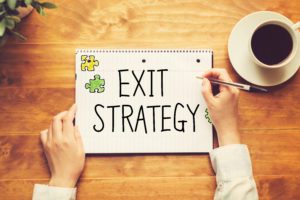Small business owners have a lot on their plates. They are responsible for the day-to-day operations of their company, and they often wear many other hats as well.
One thing that small business owners often neglect is retirement planning. This can be a huge mistake, especially if you are close to retirement age.
In this blog post, we will discuss retirement planning for small business owners and provide you with the ultimate guide!
Traditional Retirement Strategies for Small Business Owners
Retirement is an important step for small business owners. According to the Retirement Industry Trust Association (RITA), 1 in 3 Americans does not feel that they will have enough savings to retire comfortably.
Therefore, it is crucial that you get ahead of the curve. There are quite a few retirement strategies that small business owners can use to plan for their retirement. They can:
- Save money in a retirement account, such as an IRA or 401(k)
- Invest in a small business retirement plan, such as a SEP IRA or SIMPLE IRA
- Invest in a retirement annuity
- Purchase a retirement plan from an insurance company
- Sell their business to generate retirement income
Each of these options has its own set of pros and cons, so it’s important to do your research and choose the option that is right for you. Doing so can help you make smart moves that will increase your financial flow.
Traditional IRA
One popular strategy is to create a retirement savings account, such as a 401(k) or a traditional Individual Retirement Account (IRA). This allows you to save money for retirement on a tax-deferred basis.
With a Traditional IRA, you make contributions with money that has already been taxed.
You can contribute up to $6,000 per year ($5,000 if you are 50 or older) according to the IRA contribution limits. The contribution limit is the same regardless of whether you have a 401 (k) or not.
The biggest advantage of a Traditional IRA is that you will not pay taxes on the money until you withdraw it in retirement. This can be a huge benefit if you think your tax rate will be lower in retirement than it is now.
SIMPLE IRA
A Savings Incentive Match Plan for Employees (SIMPLE) IRA is a type of retirement plan that is specifically designed for small business owners.
They allow employees to contribute pre-tax money to their accounts, which can then be withdrawn tax-free once they reach retirement age.
SIMPLE IRA’s are a great way to save for retirement, and they can also be used as a tool for attracting and retaining talented employees.
SEP IRA
A Simplified Employee Pension (SEP) IRA is a retirement plan for small business owners and their employees. SEP IRAs allow you to contribute money to an account that can be used to fund your retirement.
The contributions are made by the business owner, and the money can be withdrawn by the owner and/or the employees once they reach retirement age.
Going with this plan is one way you can support your small business’ employees by helping to set them up for the future.

Precious Metals IRA
A precious metals IRA is a great way to save for retirement. With a precious metals IRA, you can invest in gold, silver, and other metals that can help protect your savings from inflation.
Precious metals IRAs are also a great way to diversify your portfolio, and they can be a good hedge against stock market volatility.
It is also now possible to rollover your IRA into metals. This is an trend we are seeing more in 2022, where traditional IRAs become Gold IRAs for example.
Silver in your IRA is also a great investment because it is a precious metal that has both industrial and investment uses. Silver prices are more volatile than gold prices, but they have the potential to provide greater returns. Silver is also a more affordable investment than gold.
If you’re interested in setting up a precious metals IRA, talk to your financial advisor about the best way to do it.
Self Employed or Solo 401(k)s
A Self Employed 401(k) is a retirement savings plan for self-employed individuals and their employees. With a Self Employed 401(k), you can make contributions to an account that can be used to fund your retirement.
There are several benefits of of a Solo 401(k):
- You can make both employee and employer contributions, up to a total of $58,000 per year ($64,500 if you are 50 or older)
- You can invest in a wide variety of assets, including stocks, bonds, mutual funds, and real estate
- The money in your account grows tax-deferred distributions from the account
This type of account can be a great way for small business owners to save for retirement.
Annuities
Another retirement strategy is to purchase annuities. Annuities can provide you with a stream of income during retirement.
There are two types of annuities: fixed and variable.
- Fixed annuities – provide you with a guaranteed income stream
- Variable annuities – have payments that can fluctuate based on the performance of the underlying investment.
Life Insurance Policies
Finally, small business owners can also use life insurance policies to help fund their retirement. Life insurance policies can be used as an investment tool and can also provide income during retirement.
There are two main types of life insurance policies: term and whole life.
Term Life Insurance
Term life insurance is a type of life insurance that provides coverage for a specific period of time, or term. It’s a good option for small business owners who want to ensure their families are taken care of financially if they die prematurely.
Term life insurance can also be used to generate money in retirement. If you have a policy that lasts until you reach retirement age, you can use the death benefit to create a tax-advantaged income stream.
This can be a helpful way to supplement your retirement savings and ensure that you have a steady income in retirement.
Whole Life Insurance
Whole life insurance is a type of permanent life insurance that not only provides coverage in the event of death, but also builds cash value over time. This cash value can be accessed in retirement to help generate money that can be used to supplement other income sources.
In addition, whole life insurance policies often come with guarantees that can help protect the policy’s value during times of market volatility.
No matter what retirement strategy you choose, it’s important to start planning for retirement early. The sooner you start, the better prepared you will be.

Developing an Exit Strategy for Your Business
As a small business owner, you have likely spent years building your company. You have poured your heart and soul into your business, and it has become a big part of your life.
Eventually, the time will come when you want to retire or sell your business. When that time comes, you need to have an exit strategy in place. It may even be beneficial for you to plan your exit strategy when you begin your business.
An exit strategy is simply a plan for how you will retire or sell your business. This plan should include things like:
- Finding a buyer for your business
- Training your successor
- Transitioning out of your role
- Determining what you will do after retirement
Developing an exit strategy can be difficult, but it is important to do if you want to retire or sell your business someday. Make sure you seek out resources on how to sell your business if you go this route.
The sooner you start thinking about your exit strategy, the better, as the preparation allows you to adapt as things change in both your life and your business.
Wrapping Up
Retirement planning is essential for small business owners. There are a variety of retirement strategies available, and the best strategy for you will depend on your individual circumstances.
If you are a small business owner, make sure to retirement planning! You can use retirement savings accounts, purchase annuities, or use life insurance policies to help fund your retirement.
Speak with a financial advisor to determine which retirement strategy is right for you and start planning for your retirement today!
What retirement strategies do you use or plan to use? Let us know in the comments below!
Frequently Asked Questions
Q: How do I set up a retirement plan for a small business?
A: You should speak with a financial advisor to determine which retirement strategy is right for you. There are a variety of retirement strategies available, and the best strategy for you will depend on your individual circumstances.
Q: What is an exit strategy?
A: An exit strategy is simply a plan for how you will retire or sell your business. This
Q: How do I start a pension plan for a small business?
A: You should speak with a financial advisor to determine which retirement strategy is right for you. There are a variety of retirement strategies available, and the best strategy for you will depend on your individual circumstances.
Q: What are some good retirement planning tips for small business owners?
A: There are a few retirement strategies that small business owners can
Q: What is the best retirement plan if you are self-employed?
A: The best retirement strategy for you will depend on your individual circumstances. You should speak with a financial advisor to determine which retirement strategy is right for you. Some retirement strategies that may be available to you include saving money in a retirement account, such as a 401(k) or an IRA, purchasing annuities, or using life insurance policies to help fund your retirement.
Q: How do I set up a 401k for small business?
A: Speak with a financial advisor to determine which retirement strategy is right for you. There are a variety of retirement strategies available, and the best strategy for you will depend on your individual circumstances.
Some retirement strategies that may be available to you include saving money in a retirement account, such as a 401(k) or an IRA, purchasing annuities, or using life insurance policies to help fund your retirement.
Q: What are some retirement planning mistakes small business owners make?
A: Some retirement planning mistakes that small business owners make include not saving enough money, not diversifying their investments, and not having a retirement plan at all!
It is important to save early and often for retirement, to diversify your investments, and to have a retirement plan in place so that you can enjoy your retirement years.
Q: What is the best retirement age for small business owners?
A: The best retirement age for small business owners depends on their individual circumstances. Some factors that may affect when you retire include your health, your financial situation, and your business goals.
Q: What is the best retirement plan if you are self employed?
A: The best retirement strategy for you will depend on your individual circumstances. You should speak with a financial advisor to determine which retirement strategy is right for you.
Some retirement strategies that may be available to you include saving money in a retirement account, such as a 401(k) or an IRA, purchasing annuities, or using life insurance policies to help fund your retirement.
Q: What is self-employed sep, simple, and qualified plans?
A: A retirement plan that is available to self-employed individuals and small business owners. This type of retirement plan allows you to make contributions to a retirement account and receive tax breaks on the money that you contribute.
There are a few different types of SEP plans, including SIMPLE SEP and qualified SEP.


